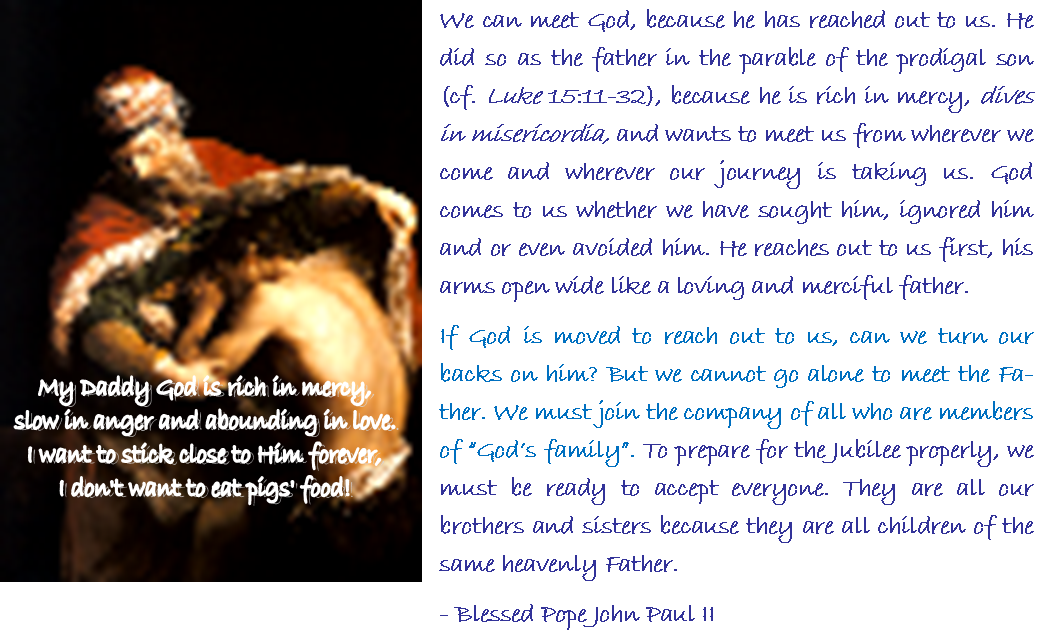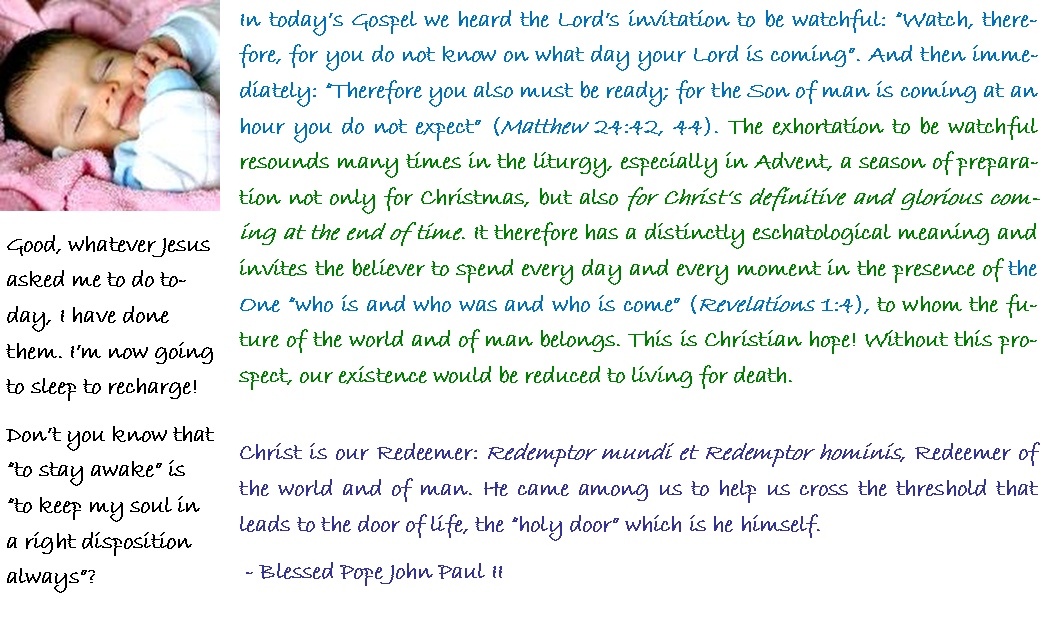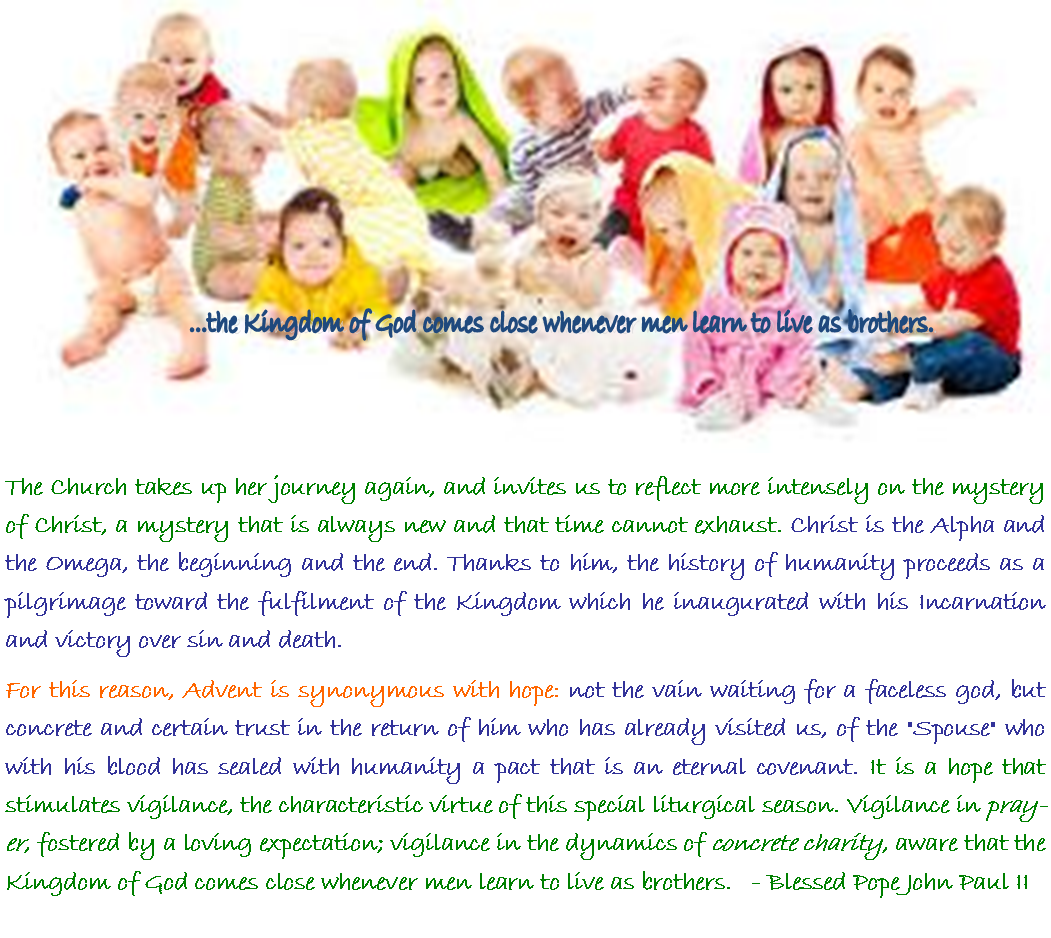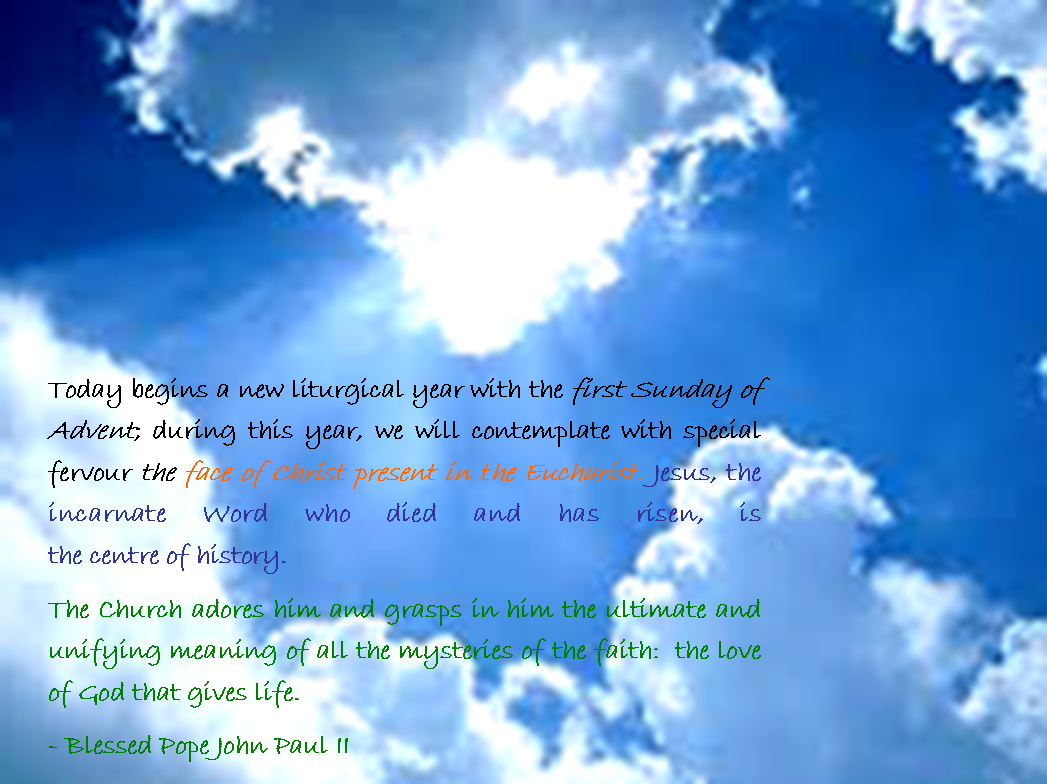|
90 |

|
It is an important phase that will see the entire Diocese focused on a vast work of evangelization in every context of life and work. At the end of this Holy Mass, I will give the missionaries their Mission Cross. We must proclaim and bear witness to Christ in every place and in every situation. I invite everyone to support this great undertaking with prayer. I am counting in particular on the contribution of cloistered religious, of the sick and the elderly who, although unable to take part directly in this great apostolic initiative, can contribute so much by their prayer and the offering of their suffering to preparing hearts to receive the Gospel message.
May Mary, whom the season of Advent urges us to contemplate in eager expectation of the Redeemer, help you all to be generous apostles of her Son, Jesus.
4. In today’s Gospel we heard the Lord’s invitation to be watchful: “Watch, therefore, for you do not know on what day your Lord is coming”. And then immediately: “Therefore you also must be ready; for the Son of man is coming at an hour you do not expect” (Matthew 24:42, 44). The exhortation to be watchful resounds many times in the liturgy, especially in Advent, a season of preparation not only for Christmas, but also for Christ’s definitive and glorious coming at the end of time. It therefore has a distinctly eschatological meaning and invites the believer to spend every day and every moment in the presence of the One “who is and who was and who is come” (Revelations 1:4), to whom the future of the world and of man belongs. This is Christian hope! Without this prospect, our existence would be reduced to living for death.
Christ is our Redeemer: Redemptor mundi et Redemptor hominis, Redeemer of the world and of man. He came among us to help us cross the threshold that leads to the door of life, the “holy door” which is he himself. |

|
5. May this consoling truth always be clearly present before our eyes, as we advance on our pilgrimage towards the Great Jubilee. It is the ultimate reason for the joy which today’s liturgy urges us to have: “Let us go joyfully to meet the Lord”. By believing in the crucified and risen Christ, we also believe in the resurrection of the flesh and in eternal life.
Tertio millennio adveniente. In this perspective the years, centuries and millenniums acquire that definitive meaning of life which the Jubilee of the Year 2000 is meant to reveal to us. Looking to Christ, we make our own the words of a popular old Polish hymn:
“Salvation came through the Cross,
With this faith in our hearts, which is the Church’s faith, today, as Bishop of Rome, I open the third year of preparation for the Great Jubilee. I open it in the name of the heavenly Father, who “so loved the world that he gave his only Son, that whoever believes in him may have eternal life” (John 3:16). Praised be Jesus Christ!
JOHN PAUL II ANGELUS Sunday, 2 December 2001
Dearest Brothers and Sisters!
1. With today's first Sunday of Advent, a new liturgical year begins. The Church takes up her journey again, and invites us to reflect more intensely on the mystery of Christ, a mystery that is always new and that time cannot exhaust. Christ is the Alpha and the Omega, the beginning and the end. Thanks to him, the history of humanity proceeds as a pilgrimage toward the fulfilment of the Kingdom which he inaugurated with his Incarnation and victory over sin and death.
For this reason, Advent is synonymous with hope: not the vain waiting for a faceless god, but concrete and certain trust in the return of him who has already visited us, of the "Spouse" who with his blood has sealed with humanity a pact that is an eternal covenant. It is a hope that stimulates vigilance, the characteristic virtue of this special liturgical season. Vigilance in prayer, fostered by a loving expectation; vigilance in the dynamics of concrete charity, aware that the Kingdom of God comes close whenever men learn to live as brothers. |

|
2. The Christian community begins Advent with these resolutions, keeping the spirit vigilant, the better to receive the message of the Word of God. In today's liturgy we hear the famous and wonderful oracle of the Prophet Isaiah, spoken at a time of crisis in the history of Israel. "In the days to come, the mountain of the Lord's house shall be established as the highest mountain and raised above the hills. All nations shall stream toward it;... they shall beat their swords into ploughshares and their spears into pruning hooks; one nation shall not raise the sword against another, nor shall they train for war again" (cf. Isaiah 2,1-5).
3. I entrust this invocation for peace to Mary, vigilant Virgin and Mother of hope. In a few days, with renewed faith we will celebrate the Solemnity of her Immaculate Conception. May she guide us on the way, helping every human person and nation to look to the "mountain of the Lord", an image of the final triumph of Christ and the advent of his Kingdom of peace.
--------------------------------------------------------------------------------------
After the Angelus, the Holy Father greeted pilgrims and visitors in Italian and Spanish. In Italian he promoted the UN Day of Disabled Persons and he greeted a special group of students from Catania. In Spanish, he greeted several parishes from Madrid and Cartagena, the Collegio Claret of Madrid and the Naval Academy of Ecuador.
Today we observe the Day of Disabled Persons promoted by the United Nations. Remembering the wonderful event of the Jubilee a year ago, I greet cordially all the persons who live with a handicap and I assure them of my spiritual closeness. I wish to show appreciation for every initiative that fosters their full and genuine social integration. |

|
JOHN PAUL II ANGELUS First Sunday of Advent, 28 November 2004
1. Today begins a new liturgical year with the first Sunday of Advent; during this year, we will contemplate with special fervour the face of Christ present in the Eucharist. Jesus, the incarnate Word who died and has risen, is the centre of history. The Church adores him and grasps in him the ultimate and unifying meaning of all the mysteries of the faith: the love of God that gives life.
2. It is in Italy precisely in these days that the preparatory work for the XXIV National Eucharistic Congress, to be held in Bari, Italy, from 21 to 29 May 2005, is starting. The theme of this important ecclesial meeting, which by providential coincidence places more emphasis on the Year of the Eucharist, is: "We cannot live without Sunday".
I invite the Italian Ecclesial Community to prepare most carefully for this spiritual appointment, rediscovering "with new intensity the meaning of Sunday: its "mystery', its celebration, its significance for Christian and human life" (Apostolic Letter Dies Domini, n. 3).
3. May Mary Most Holy, "Woman of the Eucharist" and Virgin of Advent, prepare us all to joyfully welcome Christ's coming and to celebrate worthily his sacramental presence in the mystery of the Eucharist.
Acknowledgment: We thank the Vatican Publisher for allowing us to publish the Homilies of Blessed Pope John Paul II, so that it could be accessed by more people all over the world; as a source of God’s encouragements to all of us.
CELEBRATION OF FIRST VESPERS OF THE FIRST SUNDAY OF ADVENT HOMILY OF HIS HOLINESS BENEDICT XVI St Peter's Basilica
Dear Brothers and Sisters,
Advent is, par excellence, the season of hope. Every year this basic spiritual attitude is reawakened in the hearts of Christians, who, while they prepare to celebrate the great Feast of Christ the Saviour's Birth, revive the expectation of his glorious second coming at the end of time. The first part of Advent insists precisely on the parousia, the final coming of the Lord. The antiphons of these First Vespers are all oriented, with different nuances, to this perspective. The short Reading from the First Letter to the Thessalonians (5: 23-34) refers explicitly to the final coming of Christ using precisely the Greek term parousia (cf. v. 23). The Apostle urges Christians to keep themselves sound and blameless, but above all encourages them to trust in God, who "is faithful" (v. 24) and will not fail to bring about this sanctification in all who respond to his grace. This entire Vespers liturgy is an invitation to hope, pointing on the horizon of history to the light of the Saviour who comes: "on that day a great light will appear" (Antiphon 2); "the Lord will come with great might" (Antiphon 3); "his splendour fills the whole world" (Magnificat Antiphon). This light, which shines from the future of God, was already manifest in the fullness of time; therefore, our hope does not lack a foundation but is supported by an event situated in history, which at the same time exceeds history: the event constituted by Jesus of Nazareth. The Evangelist John applies to Jesus the title of "light": it is a title that belongs to God. Indeed, in the Creed we profess that Jesus Christ is "God from God, Light from Light".
I wanted to dedicate my second Encyclical, which was published yesterday, to the theme of hope. I am pleased to offer it in spirit to the entire Church on this First Sunday of Advent, so that, during preparation for Holy Christmas, the communities and individual faithful can read and meditate upon it to rediscover the beauty and depth of Christian hope. This, in fact, is inseparably bound to knowledge of the Face of God, the Face which Jesus, the Only-Begotten Son, revealed to us with his Incarnation, his earthly life and his preaching, and especially with his death and Resurrection. True and steadfast hope is founded on faith in God Love, the Merciful Father who "so loved the world that he gave his Only Son" (John 3: 16), so that men and women and with them all creatures might have life in abundance (cf. John 10: 10). Advent, therefore, is a favourable time for the rediscovery of a hope that is not vague and deceptive but certain and reliable, because it is "anchored" in Christ, God made man, the rock of our salvation.
From the outset, as becomes clear in the New Testament and especially in the Letters of the Apostles, a new hope distinguishes Christians from those who live in pagan religiosity. In writing to the Ephesians, St Paul reminds them that before embracing faith in Christ, they had "no hope and [were] without God in the world" (2: 12). This appears an especially apt description for the paganism of our day: in particular, we might compare it with the contemporary nihilism that corrodes the hope in man's heart, inducing him to think that within and around him nothingness prevails: nothing before birth and nothing after death. In fact, if God is lacking, hope is lacking. Everything loses its "substance". It is as if the dimension of depth were missing and everything were flattened out and deprived of its symbolic relief, its "projection" in comparison with mere materiality. At stake is the relationship between existence here and now and what we call the "hereafter": this is not a place in which we end up after death; on the contrary, it is the reality of God, the fullness of life towards which every human being is, as it were, leaning. God responded to this human expectation in Christ with the gift of hope.
Continue next page ...
8 December 2013 |